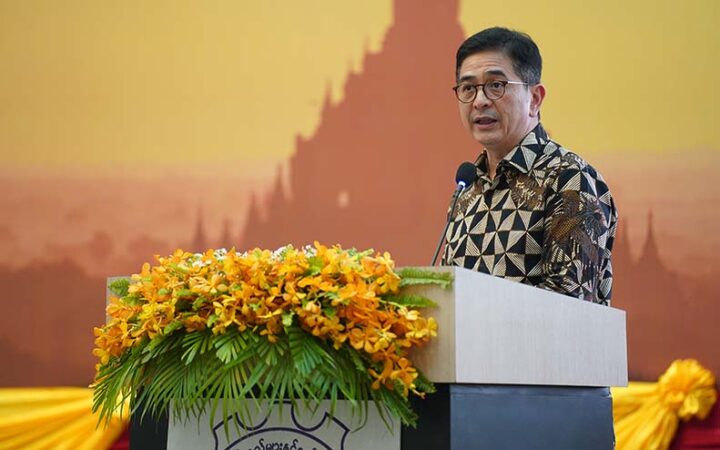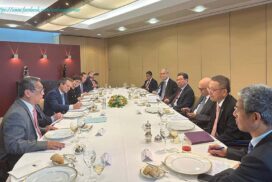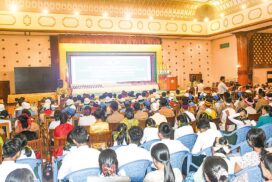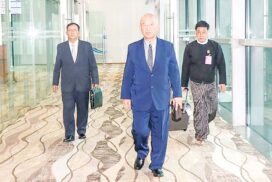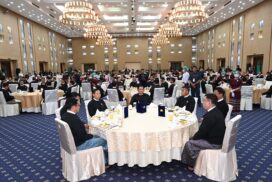ASEAN Business Advisory Council (ASEAN-BAC) Chairman Mr Arsjad Rasjid P M and his delegation have recently paid a three-day visit to Myanmar and held the “ASEAN-BAC Indonesia Roadshow Business Forum” at the Union of Myanmar Federation of Chambers of Commerce and Industry (UMFCCI), incoming chairmanship of ASEAN-BAC Myanmar.
The Global New Light of Myanmar (GNLM) had an Exclusive Interview with Mr Arsjad Rasjid P M, Chairman of KADIN (Indonesian Chamber of Commerce and Industry) and ASEAN-BAC 2023, on 2 May 2023.
The GNLM: When was the ASEAN Business Advisory Council (ASEAN-BAC) established? What is its mandate? Kindly explain its background briefly.
ASEAN-BAC Chair: The ASEAN Business Advisory Council (ASEAN-BAC) was established in April 2003 as a platform for private sector feedback and guidance to boost ASEAN’s efforts towards economic integration.
Since its establishment, the council has played a vital role in promoting private sector engagement. By providing feedback, ASEAN-BAC helps to identify priority areas for consideration by ASEAN leaders. This ensures that the needs and concerns of the private sector are considered in the formulation of policies and strategies to promote economic development in the region. By fostering closer cooperation between businesses across ASEAN, ASEAN-BAC helps to facilitate trade and investment, create jobs, and drive innovation in ASEAN.
The GNLM: As you mentioned that the ASEAN-BAC had been rolling out legacy projects since 2015, please tell us further information about them.
ASEAN-BAC Chair: ASEAN BAC has been working on various legacy projects since 2015, and each year we incorporate Private Public Partnership (PPP) to promote human capital development and entrepreneurship.
Under our five priorities, Indonesia has developed eight different legacy projects. The first priority is Digital Transformation, and under this, we have developed the ASEAN QR Code, Marketplace Lending platform, and Wiki Entrepreneur.
The second priority is Sustainable Development, and we have developed the ASEAN Net Zero Hub and Carbon Centre of Excellence.
For Health Resilience, we have the ASEAN One Shot Campaign. And for Food Security, we have an inclusive closed-loop model for Agricultural Products. Finally, under Trade & Investment, we have developed the ASEAN Business Entity.
Each of these legacy projects has been designed to promote economic integration and benefit the region as a whole.
By bringing together the public and private sectors, we aim to create sustainable solutions that will drive development in ASEAN.
The GNLM: We are aware that the ASEAN-BAC, on Indonesian Chairmanship, is launching into the Myanmar Roadshow during your three-day visit. We would appreciate it if you could kindly expand our knowledge of the Myanmar Roadshow more profoundly.
ASEAN-BAC Chair: The ASEAN-BAC has been conducting a roadshow across ASEAN countries since February to promote business, enhance connectivity, and support economic recovery. The Myanmar visit is the sixth, and we are meeting with key business leaders, including the Union of Myanmar Federation of Chambers of Commerce and Industry and the Myanmar Investment Commission.
As part of Indonesia’s ASEAN BAC Chairmanship, we hope to strengthen cooperation and trust between ASEAN and Myanmar and explore potential economic partnerships. We believe that ASEAN businesses, particularly in Myanmar, can play a crucial role in promoting people-to-people engagement and building bridges of understanding towards a prosperous future for both Myanmar and ASEAN. Myanmar is a country with vast potential for economic growth and development.
For example, the country has significant solar and wind energy potential, with an estimated 26.96 GW and 33.83 GW, respectively. Additionally, Myanmar’s rich reserves of critical minerals are crucial for the growth of various industries, including the solar panel, lithium battery, and electric vehicle industries in ASEAN. Overall, Myanmar’s potential presents a strong foundation for growth and development, with ample room to expand further.
The GNLM: We are also keen on the ASEAN-BAC Set Ambitious Agenda, especially Food Security. Kindly elaborate on this particular agenda in the context of Myanmar.
ASEAN-BAC Chair: ASEAN-BAC is committed to addressing food security in the region and we acknowledge that achieving food security requires collaboration between businesses and communities.
The private sector plays a crucial role in promoting sustainable agriculture practices, investing in agribusiness, and creating innovative solutions to address food insecurity. To do this, ASEAN-BAC 2023 creates a single narrative that includes commodity profiling, commodity balance sheet, key success factors & roadmap, and key policies to address food security. The single narrative approach enables ASEAN members to customize policies and strategies to address their unique challenges.
Thus, the Council has developed a food security programme based on an inclusive closed-loop model for the agriculture sector. The closed-loop model for agricultural products will empower medium and small agricultural enterprises by providing them with access to finance, knowledge, technology, and new markets. The ultimate goal of these efforts is to ensure that everyone in the ASEAN region has access to safe, nutritious, and affordable food.
In the context of Myanmar, the agricultural sector plays a vital role in the country’s economy, with over 48 per cent of the labour force engaged in farming.
However, despite the abundance of agricultural resources, many farmers lack access to business resources such as financing, technology, and markets, which hinders their ability to increase productivity and profitability.
This creates a gap between the potential of the agricultural sector and its actual contribution to the country’s economy.
Thus, there is a need to develop inclusive business models, such as the closed-loop model for agricultural products, that can empower small and medium agricultural enterprises and provide them with access to the resources they need to thrive.
The GNLM: We’d like to know more about the Net Zero target.
ASEAN-BAC Chair: The Net Zero target is an important goal that every country should strive to achieve.
And it is well-established that the private sector has a critical role to play in promoting sustainable development and driving progress towards Net Zero.
Therefore, at ASEAN-BAC, our focus is on supporting the private sector in its journey towards carbon neutrality. To this end, ASEAN-BAC is executing two legacy projects that aim to mainstream sustainable development in the region. The first is a pan-regional Net Zero Hub that aims to assist the private sector in its journey towards carbon neutrality, focused on promoting best practices and developing innovative solutions. The second is a Carbon Centre of Excellence that will provide research and expertise on carbon reduction strategies. Our ultimate goal is to support the private sector in achieving carbon neutrality and help the region move towards a sustainable future.
